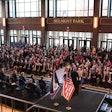It started with the parade. The editors at Advertising Age mocked Advertising Week's "Walk of Fame" planned for favorite ad characters like Tony the Tiger and the Aflac duck, and suddenly the parade of costumed characters that went with it—held annually since 2004—was canceled. Organizers said it had nothing to do with the bad press, and simply wasn't worth the investment.
Today, the trade magazine threw down the gauntlet, with a no-holds-barred editorial decrying the blandness of last week's conference. The headline pretty much says it all: Advertising Week Has No Excuse for Being Boring. But here's more, on the conference's programming: "There were no surprises and no must-sees ... just the nonstop babble of intelligence-insulting, soul-dampening, pulse-deadening conference speak that, in apparently unintentional ways, did more to throw a light on the industry's problems than its opportunities."
This is the fourth year for the conference, which is billed as a weeklong celebration of the industry's creativity as well as a look at the social and economic issues of the advertising world. Back in 2005, we talked to the conference's executive director, Matt Scheckner, about how he was addressing criticism of the first iteration while planning the second. You can read our Q&A with him here.
Today, the trade magazine threw down the gauntlet, with a no-holds-barred editorial decrying the blandness of last week's conference. The headline pretty much says it all: Advertising Week Has No Excuse for Being Boring. But here's more, on the conference's programming: "There were no surprises and no must-sees ... just the nonstop babble of intelligence-insulting, soul-dampening, pulse-deadening conference speak that, in apparently unintentional ways, did more to throw a light on the industry's problems than its opportunities."
This is the fourth year for the conference, which is billed as a weeklong celebration of the industry's creativity as well as a look at the social and economic issues of the advertising world. Back in 2005, we talked to the conference's executive director, Matt Scheckner, about how he was addressing criticism of the first iteration while planning the second. You can read our Q&A with him here.



















